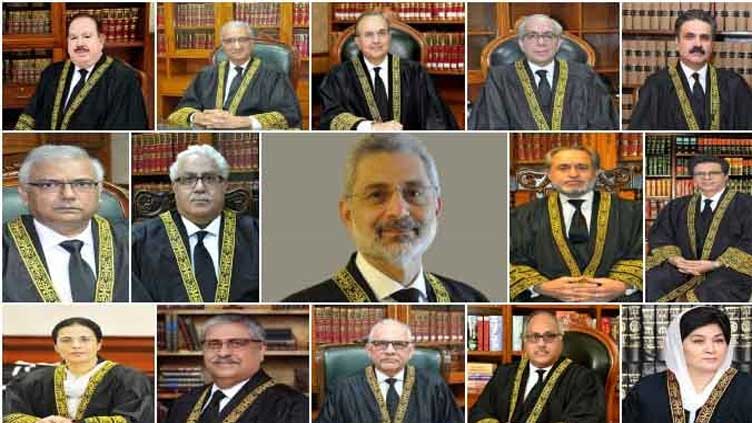The Supreme Court (SC) full bench on Monday (today) resumed hearing a set of petitions to limit powers of the Chief Justice of Pakistan (CJP).
The 15-member full court bench of the Supreme Court of Pakistan ((SC) is headed by the CJP. The petitioners have challenged the Supreme Court (Practice and Procedure) Act 2023 which is aimed at regulating the powers of the Chief Justice of Pakistan.
The full court bench comprises CJP Isa, Justice Sardar Tariq Masood, Justice Ijazul Ahsan, Justice Syed Mansoor Ali Shah, Justice Munib Akhtar, Justice Yahya Afridi, Justice Aminuddin Khan, Justice Sayyed Mazahar Ali Akbar Naqvi, Justice Jamal Khan Mandokhel, Justice Muhammad Ali Mazhar, Justice Ayesha A. Malik, Justice Athar Minallah, Justice Syed Hasan Azhar Rizvi, Justice Shahid Waheed and Justice Musarrat Hilali.
The proceedings of the case is being broadcast live by state-run PTV.
As the hearing started, Supreme Court Bar Association President Abid Zuberi said Parliament was not authrorised to make rules regarding practice and procedure act. He said by do so the parliament misused its pwoers. He said the term ‘subject to law’ in the constitution did not mean parilament was authorised to enact laws about judiciary. Zuberi said only the Supreme Court could make laws about judiciary keeping itself in the parameters of existing laws.
The CJP then asked to the SCBA president, “If words ‘subject to law’ are removed from the constitution, will these make any impact?”. Zuberi said removal of these words would not make any difference.
The CJP expressed his annoyance over submitting fresh documents in the case. He said such documents should have been submitted earlier. Justice Isa said he did not expect such an attitutde from a senior lawyer.
Justice Ijazul Ahsan remakred Supreme Court was authorised had the authority to make rules about itself and these were given by the constitution.
Justice Muneeb Akhtar said constitution makes it binding to make rules according to law and constitution, and that meant the rules would be made as per prevailing laws.
The CJP said Supreme Court was busy in hearing practice and procedure law petitions and the other cases were pending, this was adding to the backlog of cases.
He said they had to wind up the arguments and decide the case today. He asked the SCBA president to finish his arguments by 11:00 am. He then asked to Zuberi,
“Did you submit your written arguments in the case?” The SCBA president said he had just submitted his arguments in the court.
Zuberi said he wanted the apex court to have a look on a decision given by New Jersey court of the US.
Upon that the CJP remarked that he should not downgrade the apex court to such a level. Justice Isa said Zuberi should have referred to any decision as a precedent by the Supreme Court of the US but he was showing them a ruling of the New Jersey court. He said even it was not a ruling too.
CJP Isa said, “Parliament is usually asked to complete the number game but when a single person assumes power and makes amendment, it is considered as right. If parliament wants to make something good, why do you want to crush it?”
Justice Athar Minallah asked Zuberi to advance arguments on expanding jurisdiction of the Supreme Court. Justice Minallah said he was of the view that provincial assemblies were not empowered to make such rules.
The CJP then asked the SCBA president to wind up the discussion and complete arguments. Justice Minallah said, “If someone files review petition under Article 188, he cannot avail facility of appeal. The act does not grant right of appeal against review.”
The CJP asked Zuberi if apex court had to face all the burden why the SCBA president was getting tense. He then told Zuberi he had finished arguments and now court was going to hear other party.
During the earlier hearing, CJP Justice Qazi Faez Isa had questioned how the Supreme Court (Practice and Procedure) Act 2023 could curtail the powers of the apex court. CJP Isa had regretted how vesting of authority in an individual’s hands had destroyed the country.
At one point, Justice Akhtar feared the parliament’s involvement in bench-making would undermine separation of powers.
At the outset of the hearing, he said as too many cases were still pending with the top court, the apex court would try to conclude proceedings on petitions challenging the Supreme Court (Practice and Procedure) Act 2023 today.
In his remarks, the chief justice said it would be their effort to complete hearing of the case today. He, however, said if the counsel desired, they might also submit written arguments.
Post Views: 93


 Sports3 months ago
Sports3 months ago
 Fashion2 months ago
Fashion2 months ago
 Sports3 months ago
Sports3 months ago
 pakistan3 months ago
pakistan3 months ago
 pakistan3 months ago
pakistan3 months ago
 World2 months ago
World2 months ago
 World2 months ago
World2 months ago
 Sports2 months ago
Sports2 months ago




















